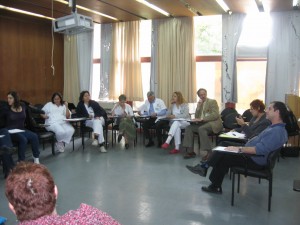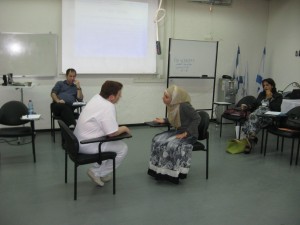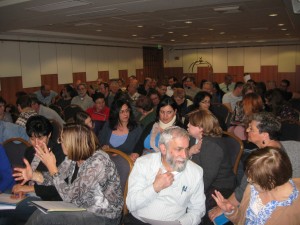The JICC in Sefad at the Ziv Medical Center
Even though the JICC is focusing on the Jerusalem area, we find more and more cases in which the expertise we gained in the city is important in capacity building in other places. One example was today, when some 20 members of the senior administration staff of the Ziv Medical Center in Sefad gathered for a unique workshop on cultural competency, facilitated by the Jerusalem Intercultural Center (JICC). The workshop was organized by Dr. Sarah Nissim, Deputy Director of the Nursing School and Cultural Competency coordinator for the hospital. Dr. Nissim had asked the JICC to present cultural competency to the senior managers, before they began to assimilate the principles in the hospital. Sarah, who is a veteran colleague of the JICC in cultural competency, sought to engage the JICC to facilitate the assimilation of cultural competency principles in the hospital, as per the Ministry of Health directive, in the 2012 work year.
Dr. Shapiro Klein, Deputy Director of the hospital and Dr. Sarah Nissim (Cultural Competency coordinator) began the workshop with opening remarks.
At the beginning of the day the participants shared their experiences of intercultural encounters in the different departments. Thus, for example, one person detailed the difficulties dealing with a Druze girl with an eating disorder. Another doctor spoke about the difficulty working with the Haredi community and its rabbis, despite the dialogue that takes place from time to time between local rabbis and medical staff. We saw the huge difference between the Jerusalem hospitals that deal with diverse communities within the Jerusalem region, as opposed to Ziv, which deals with diverse communities over a vast area (mostly the upper and eastern Galilee and the Golan Heights), which requires a different type of communication with the different community heads.
As such, the first ‘theoretical’ part of the workshop dealt with tools and ways to bridge the gaps between cultures. These tools followed a clarification of the concept of ‘cultural dimensions’, and an analysis of dialogues between patient and caregiver in which different cultural values are presented.
The second part provided practical tools for professional medical interpretation, as well as practical suggestions on how to relate to non-professional interpreters, through movies and analysis of case studies, from Israel and around the world. Immediately after lunch the participants practiced their knowledge of intercultural issues – a specially-trained actress played a Haredi and Palestinian patient in two separate scenarios.
This workshop was used as a kickoff to the process of assimilating cultural competency principles into the hospital, which will be led by Dr. Sarah Nissim. Part of the plans discussed with her include a workshop for bilingual staff members to overcome the communication problems with the Ethiopian community and training of facilitators from among the hospital staff to establish a set mechanism of training medical staff at the Ziv Medical Center in Sefad.




